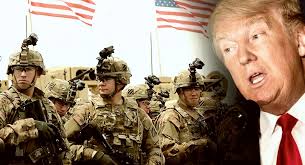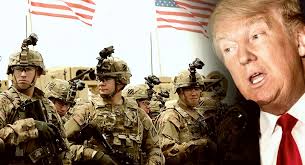Soaring tensions of the past nearly two weeks paving the way for a potential direct military clash in the Persian Gulf between the US and Iran could be de-escalating as rapidly as they began as the president attempts to reign in hawks in his own administration, per a new report in FT:
President Donald Trump said he hoped the US would not go to war with Iran, cooling tensions at the end of a week in which worries spiked over the risk of conflict between the US and the Islamic republic. As he stood outside the West Wing waiting to meet Swiss president Ueli Maurer on Thursday, Mr Trump was asked by a reporter whether the US was going to war with Iran. He replied: “I hope not.”
This as the WSJ also reports Trump is fast reigning in his two Iran hawk horsemen of the apocalypse Bolton and Pompeo: “There are sharply differing views within the Trump administration over the meaning of intelligence showing Iran and its proxies making military preparations, people familiar with the matter said,” according to the report.
So Trump doesn’t want war, and now with the Senate demanding it be given a comprehensive briefing on just what the increased Iran threat constitutes and the intelligence consensus behind it (or lack thereof), it looks like the war train could be grinding to a halt.
Bloomberg also agrees, per its latest report:
President Donald Trump is wary of drawing the US into a war with Iran, in part out of concern that an armed conflict with the Islamic Republic would imperil his chances at winning a second term, according to people familiar with the matter. US’s evidence of Iran threat readied for release by Pentagon.
But the Pentagon war machine’s next move could hinge on what’s been revealed as the initial key piece of intelligence “evidence” of Iran’s “attack preparations” that got us here in the first place, starting with Bolton’s May 5th announcement of a major Iranian threat escalation. The “smoking gun” that started it all apparently hinges on satellite photos showing Iranian paramilitary forces moving missiles on boats in the Persian Gulf (perhaps even in their own territorial waters!?).
The New York Times cited three defense officials who confirmed that, “The intelligence that caused the White House to escalate its warnings about a threat from Iran came from photographs of missiles on small boats in the Persian Gulf that were put on board by Iranian paramilitary forces.”
But crucially, according to US intelligence officials cited by the WSJ, the “missile movement” satellite photographs may have just been picking up on Iranian defensive measures that came in reaction to Tehran’s belief that a US military attack was on the horizon.
“Intelligence collected by the US government shows Iran’s leaders believe the US planned to attack them, prompting preparation by Tehran for possible counterstrikes, according to one interpretation of the information,” reports The Wall Street Journal’s Warren Strobel, Nancy Youssef, and Vivian Salama.
Today, in catastrophic wars almost started by uber hawk John Bolton: “Intel collected by the U.S. government shows Iran’s leaders believe the U.S. planned to attack them, prompting preparation by Tehran for possible counterstrikes” -WSJ source https://t.co/xdu2urIaEu
— Eli Clifton (@EliClifton) May 17, 2019
However, what was originally set in motion itself has momentum enough to spark confrontation, given on Thursday two Navy destroyers have entered the Persian Gulf as the American military continues to add to its assets in the region to head off any planned Iranian “aggression,” USNI reported.
The USS McFaul and USS Gonzalez traveled through the Strait of Hormuz Thursday afternoon without being challenged by IRGC forces. They joined the USS Abraham Lincoln, which is stationed in the Gulf of Oman, as well as a strike force that includes several B-52 bombers out of Qatar.
So there it is: formula for de-escalation; however, the chances of some “accident” happening which leads to clashes remains high and unpredictable, at which point the intelligence debate Congress is demanding could turn into a moot afterthought, as is the pattern with many US wars.
Reprinted with permission from ZeroHedge.


